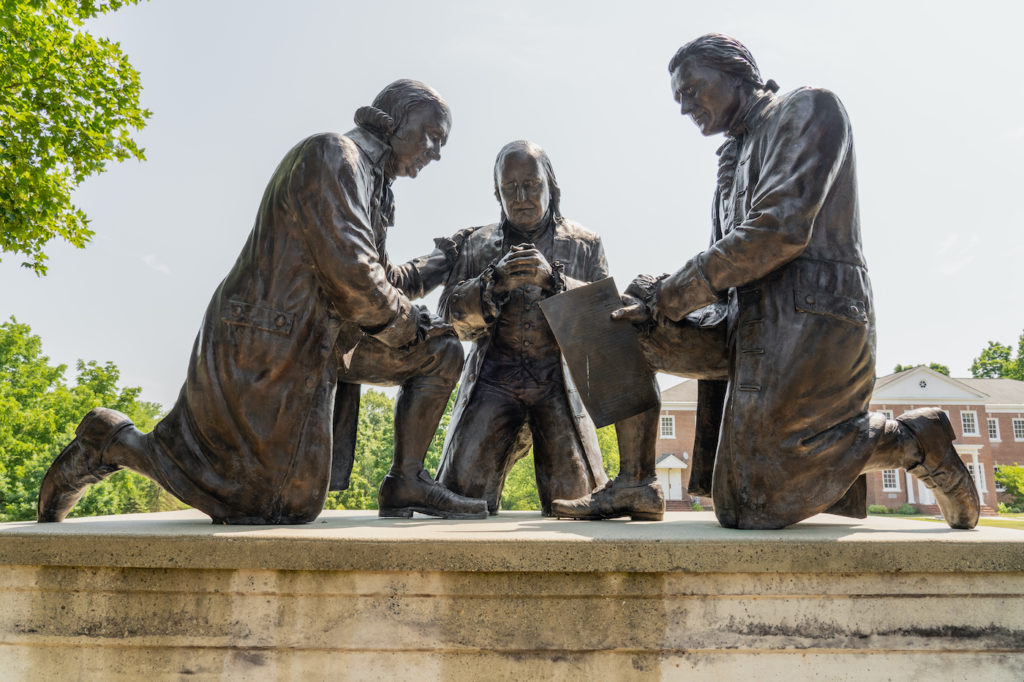Promoters of the originalist theory of constitutional interpretation are at a crossroads. Many Americans, in particular religious and social conservatives, are questioning the ability of originalism and textualism to yield good results. They also doubt the sincerity of federal judges who claim to adhere to these philosophies, and of politicians who campaign on confirming those judges.
The problem was magnified last year by Justice Neil Gorsuch’s majority opinion in Bostock v. Clayton County, Georgia (2020), which expanded protections under Title VII of the Civil Rights Act of 1964 to include gay and transgender persons. Sen. Josh Hawley summed up well the reaction of many conservatives:
This decision . . . represents the end of the conservative legal movement, or the conservative legal project, as we know it. After Bostock, that effort, as it has existed up to now, is over. I say this because . . . if you can invoke textualism and originalism in order to reach such a decision—an outcome that fundamentally changes the scope and meaning and application of statutory law—then textualism and originalism and all of those phrases don’t mean much at all.
The crisis is ever more urgent with Dobbs v. Jackson Women’s Health Organization—the biggest abortion case since Planned Parenthood v. Casey—on the Supreme Court’s docket for this term.
Start your day with Public Discourse
Sign up and get our daily essays sent straight to your inbox.Much of today’s originalism is little different from positivism, which rejects the relationship between law and morality. Some of its greatest advocates have come to prioritize procedure over principle, loving law itself more than the justice that law is meant to protect.
Some have called for a replacement theory, like “common good constitutionalism.” The trouble is, without a coherent conception of what the common good is in relation to the Constitution, such an approach would be nothing more than rule-of-the-stronger power politics, like living constitutionalism. Others argue that originalism can be saved by infusing it with a proper understanding of the common good. Still others think that originalism is fine, but conservatism lacks the institutional infrastructure to combat the Left.
Before we attempt to develop any new theories, why not look to what—or whom—we already have?
Last month marked the thirtieth anniversary of Justice Clarence Thomas’s confirmation to the Supreme Court. Three decades later, the hearings’ discussion of the “natural law thing” (as then-Senator Joe Biden called it) remains as relevant as ever, especially for originalism. Thomas’s approach to constitutionalism restores the morality of law—which has been discarded by both positivist originalists and living constitutionalists alike—but at the same time avoids creating a new theory out of whole cloth. Although his statements about natural law were not comprehensive, given the limitations of the hearings’ format, Thomas made three clear points that can guide our approach to constitutional interpretation today.
The Founders’ Political Theory
First, by “natural law,” or what he sometimes calls “higher law,” Thomas refers to a broader political philosophy articulated during the Founding. He explains:
My interest in the whole area [of natural law] was as a political philosophy. My interest was in reassessing and demonstrating a sense that we understood what our Founding Fathers were thinking when they used phrases such as “All men are created equal,” and what that meant for our form of government.
Talk of natural law evokes many different philosophers and theories, but when Thomas uses the phrase, he has something very particular in mind. As he tells in his memoir My Grandfather’s Son:
I led my staffers (especially Ken Masugi and John Marini) in discussion of the natural-law philosophy with which the Declaration of Independence, America’s first founding document, is permeated. “All men are created equal,” Thomas Jefferson had written in 1776. “They are endowed by their Creator with certain unalienable Rights.” That’s natural law in a nutshell: if all men are created equal, then no man can own another man, and we can only be governed by our consent.
Thomas’s point is simple. The Constitution and the laws promulgated under it presume a common set of moral principles, grounded in the political theory of the Founding, which was best expressed in the Declaration of Independence. The equality principle, rightly understood, is the focal point of that theory, which leads to consent, natural rights, and separation of powers. When Americans hear “natural law” today, they likely think of Catholic moral teaching, especially on abortion and sex. Academics might think of Cicero, St. Thomas Aquinas, or New Natural Lawyers. But Thomas isn’t invoking any of these traditions directly. For Thomas—at least in the American context—the natural law is nothing more than an acknowledgment that the framework of the Constitution depends on the principles of the Declaration and therefore must be interpreted in light of them. As one of Thomas’s primary intellectual influences, Harry V. Jaffa, wrote in How to Think About the American Revolution:
The idea of Equality, as expressed in the Declaration, is the key to the morality of “the laws of nature and of nature’s God.” It is this natural law which the Constitution—and the regime of which the Constitution is a feature—is designed to implement.
The Limits of Natural Law in Constitutional Interpretation
Second, Thomas clarifies how natural law should and should not influence a judge’s interpretive work: “I don’t see a role for the use of natural law in constitutional adjudication. My interest in exploring natural law and natural rights was purely in the context of political theory.” The judge must not use his authority to advance personal public policy preferences. At the time of his hearings, liberal critics of Thomas’s natural law views feared that he might use appeals to natural law to promote his own agenda, especially on the question of abortion. This of course mirrors the fear that conservatives in favor of judicial restraint had toward living constitutionalists.
For Thomas—at least in the American context—the natural law is nothing more than an acknowledgment that the framework of the Constitution depends upon the principles of the Declaration and therefore must be interpreted in light of them.
Thomas seeks to rule, not on the basis of his understanding of natural law, but of the Constitution understood through its natural law foundation. Principles of natural law come into play only when what the text of the law or the Constitution requires is unclear for the case in question, or when a broader consultation of the political theory driving the Constitution becomes necessary. For example, for Thomas, interpreting the “straightforward text” of the Time, Places and Manner Clause (which stipulates guidelines for congressional elections), ordinarily does not require an appeal to natural law. Second Amendment interpretation, by contrast, is trickier. Common good constitutionalism calls the decision in District of Columbia v. Heller (2008) supporting a constitutional right to own guns “revolutionary.” But when Thomas considers the Second Amendment, he correctly identifies the right to keep and bear arms for self-defense as “inalienable,” and therefore interprets and applies the Second Amendment with this political theory in mind.
The Principles of the Declaration Are the Key to the Constitution
Third, if natural law has no direct role to play in adjudication, what role should it play? Why would a judge need to understand its principles? Thomas answers that, although the principles of natural law do not appear explicitly in the Constitution, they were the justification of the Founders’ whole project, as the Founders stated clearly in the Declaration of Independence, state constitutions, and state bills of rights. Those and other public documents set forth the goal of limited government, grounded on a social compact based on equality, natural rights, and the consent of the governed. The Founders understood their project to follow necessarily from these principles, such that any law that is repugnant to them would have to be repugnant to the Constitution itself.
Judges and ordinary citizens cannot possibly understand how to apply the Constitution without understanding the fundamental first principles that give it legitimacy. Thomas noted during his confirmation hearings that the Founders’ natural law theory helps us understand “why . . . we should have a government that [does] not infringe on the rights of individuals or a government by consent rather than [one in which] our rights emanat[e] from that government.” It provides a sure protection for the rule of law against government by force, will, or ungrounded abstractions. As Thomas explained in a speech in 1988:
Far from being a license for unlimited government and a roving judiciary, natural rights and higher law arguments are the best defense of liberty, and of limited government. Moreover, without recourse to higher law, we abandon our best defense of a court that is active in defending the Constitution but judicious in its restraint and moderation. Higher law is the only alternative to the willfulness of both run-amok majorities and run-amok judges.
Thomas’s view of the natural law also provides transcendent standards for evaluating the goodness of particular actions of the government. It does not direct government toward some vague notion of the common good, whose content must be determined by the demands of the times. Rather, it entails specific rights and liberties, which apply across all times and circumstances.
The Founders understood their project to follow necessarily from natural law principles, such that any law that is repugnant to them would have to be repugnant to the Constitution itself.
Non-arbitrary rule requires standards to guide and limit that rule. In the American context, those standards are most visibly provided by the Constitution, but Thomas thinks that our constitutional structures are “unintelligible” without a higher law to guide them. As he wrote in 1987:
Men cannot rule others by their consent unless their common humanity is understood in light of transcendent standards provided by the Declaration’s “laws of nature and of nature’s God.” Natural law provides a basis in human dignity by which we can judge whether human beings are just or unjust, noble or ignoble.
Human dignity, natural equality, and other immutable truths do not change to suit the popular sentiments of the day. They are rooted in a permanent natural order, the standards of which human reason can discern, and which the Founders articulated well.
Thomas’s Approach in Practice and Its Prospects Today
Good examples of Thomas’s natural-law approach are his recent Establishment Clause opinions. In his concurrence in Espinoza v. Montana Department of Revenue (2020), Thomas rebukes a seventy-three-year-old precedent, exposing the faux “equality principle” that would prohibit states from expressing any preference for religion. A proper understanding of equality with respect to the Establishment Clause would allow for a “robust and lively debate about the role of religion in government” at the state and local level. Advocates for civic religion and virtue could freely make their case and attempt to influence public morals. By contrast, the Court’s jurisprudence of recent decades suggested “that religion is dangerous and in need of policing.” This stance has denigrated free exercise rights and those citizens who “adhere to traditional moral standards.”
What effect a broader adoption of Thomas’s approach might have is difficult to tell, especially because it seems unlikely that we could relearn the principles of the Founding generation any time soon. Even in 1991, during Thomas’s hearings, virtually no senators on either side of the aisle could articulate the role of natural law in understanding the Constitution, and very few commentators can today, let alone the public. By merely trying to do so, Thomas is an outlier.
Perhaps the greatest utility in Thomas’s approach lies in its potential for disruption. His commitment to separation of powers, coupled with his refusal to be hampered by stare decisis, could be the grounding needed to rein in the administrative state and correct the dysfunctions of the three branches of government.
But what originalists and their opponents should bear in mind most of all, is that a functioning constitutionalism, that protects the people’s rights and fosters good governance, requires a sound political theory behind it. Times have changed, but Thomas is right that the version of natural law expressed in the Declaration remains as sound and useful as ever. It is the primary resource needed for a sound judicial philosophy—much more so than disputed notions of the common good—because it consists of the implicit morality behind the Constitution. Contrary to the views of the legal positivists, the Constitution was made to implement the natural law of the Declaration. Any legitimate method of constitutional interpretation must be grounded in the Declaration’s principles.














